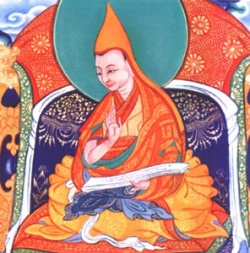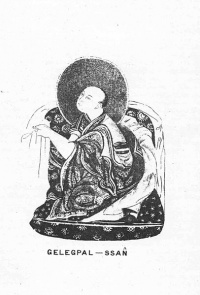Difference between revisions of "1st Panchen Lama"
| Line 2: | Line 2: | ||
[[Khedrup Gelek Pelzang]] (1385–1438), better known as [[Khedrup Je]] (''[[mkhas grub rje]]''), the [[1st Panchen Lama]], was one of the main [[disciples]] of [[Lama]] [[Tsongkhapa]] (founder of the [[Gelug tradition]] of [[Tibetan Buddhism]]). | [[Khedrup Gelek Pelzang]] (1385–1438), better known as [[Khedrup Je]] (''[[mkhas grub rje]]''), the [[1st Panchen Lama]], was one of the main [[disciples]] of [[Lama]] [[Tsongkhapa]] (founder of the [[Gelug tradition]] of [[Tibetan Buddhism]]). | ||
| − | Before becoming [[Tsongkhapa's]] foremost [[disciple]], [[Khedrup Je]] had been a learned [[Sakyapa]] [[scholar]]. He is considered to be a [[reincarnation]] of [[Manjushri]], the [[Buddha | + | Before becoming [[Tsongkhapa's]] foremost [[disciple]], [[Khedrup Je]] had been a learned [[Sakyapa]] [[scholar]]. He is considered to be a [[reincarnation]] of [[Manjushri]], the [[Buddha of Wisdom]]. He wrote an important text on [[Kalachakra]] [[initiation]] which is still used by [[Tenzin Gyatso]], the [[14th Dalai Lama]], as the basis of his public [[initiations]] into the [[Kalachakra]]. Altogether, there are nine volumes of his collected works, containing fifty-eight treatises |
[[File:Gelegpal-Ssan.jpg|thumb|left|200px|Khedrup Je]] | [[File:Gelegpal-Ssan.jpg|thumb|left|200px|Khedrup Je]] | ||
[[Khedrup]] was posthumously decided to have been a previous [[incarnation]] of [[Lobsang Chökyi Gyaltsen]] (1570–1662), and is considered to be the [[First Panchen Lama]] and, like all the [[Panchen Lamas]], was an [[incarnation]] of [[Amitabha Buddha]]. | [[Khedrup]] was posthumously decided to have been a previous [[incarnation]] of [[Lobsang Chökyi Gyaltsen]] (1570–1662), and is considered to be the [[First Panchen Lama]] and, like all the [[Panchen Lamas]], was an [[incarnation]] of [[Amitabha Buddha]]. | ||
Revision as of 12:41, 4 August 2014
Khedrup Gelek Pelzang (1385–1438), better known as Khedrup Je (mkhas grub rje), the 1st Panchen Lama, was one of the main disciples of Lama Tsongkhapa (founder of the Gelug tradition of Tibetan Buddhism).
Before becoming Tsongkhapa's foremost disciple, Khedrup Je had been a learned Sakyapa scholar. He is considered to be a reincarnation of Manjushri, the Buddha of Wisdom. He wrote an important text on Kalachakra initiation which is still used by Tenzin Gyatso, the 14th Dalai Lama, as the basis of his public initiations into the Kalachakra. Altogether, there are nine volumes of his collected works, containing fifty-eight treatises
Khedrup was posthumously decided to have been a previous incarnation of Lobsang Chökyi Gyaltsen (1570–1662), and is considered to be the First Panchen Lama and, like all the Panchen Lamas, was an incarnation of Amitabha Buddha.
Traditionally, there were considered to be four Indian and three Tibetan incarnations before Khedrup, starting with Subhuti, one of the original disciples of Gautama Buddha.
Khedrup Je was unanimously chosen as Ganden Monastery's third abbot (after Tsongkhapa and Gyaltsab Je) by its monks, and also became the Ganden Tripa, the leader of the Gelug tradition.
Khedrub Je was a prolific writer (for example on Kalachakra), and founded Baiju Monastery in Gyantse District in Tibet in 1418. He also wrote many prayer books.
- “According to the legend, after Tsongkhapa passed away in 1419, his disciple Khedrub Jey on five occasions met with him in mystical states. Kedrub Jey is most remembered for his charisma as a teacher, as well as for the many excellent commentaries that he wrote on the tantric lineages which Tsongkhapa gathered together and elucidated. He played an important role in the education of the First Dalai Lama, who was the youngest of Tsongkhapa's five chief disciples.”
He founded the large Riwo Choling Monastery in the Yarlung Valley which is now just a heap of ruins.

